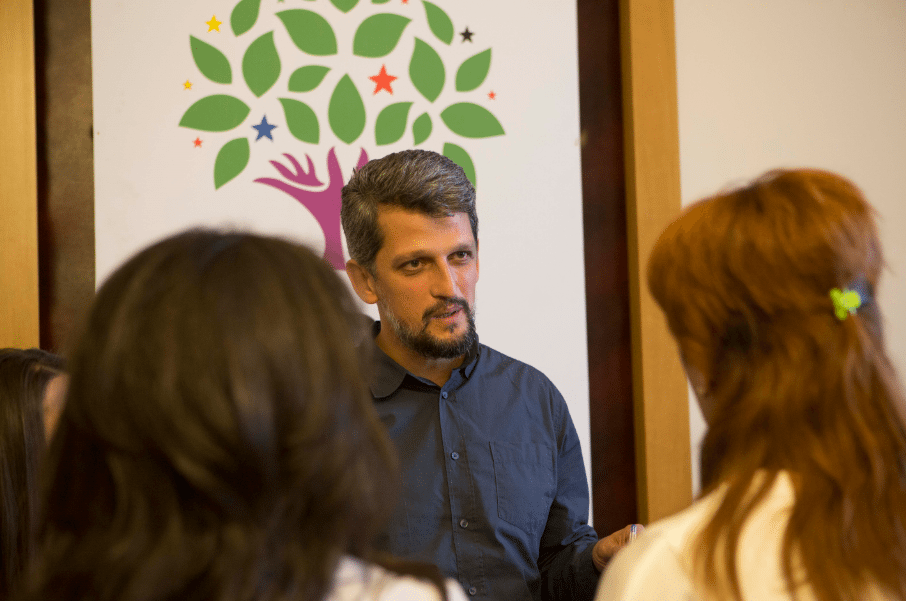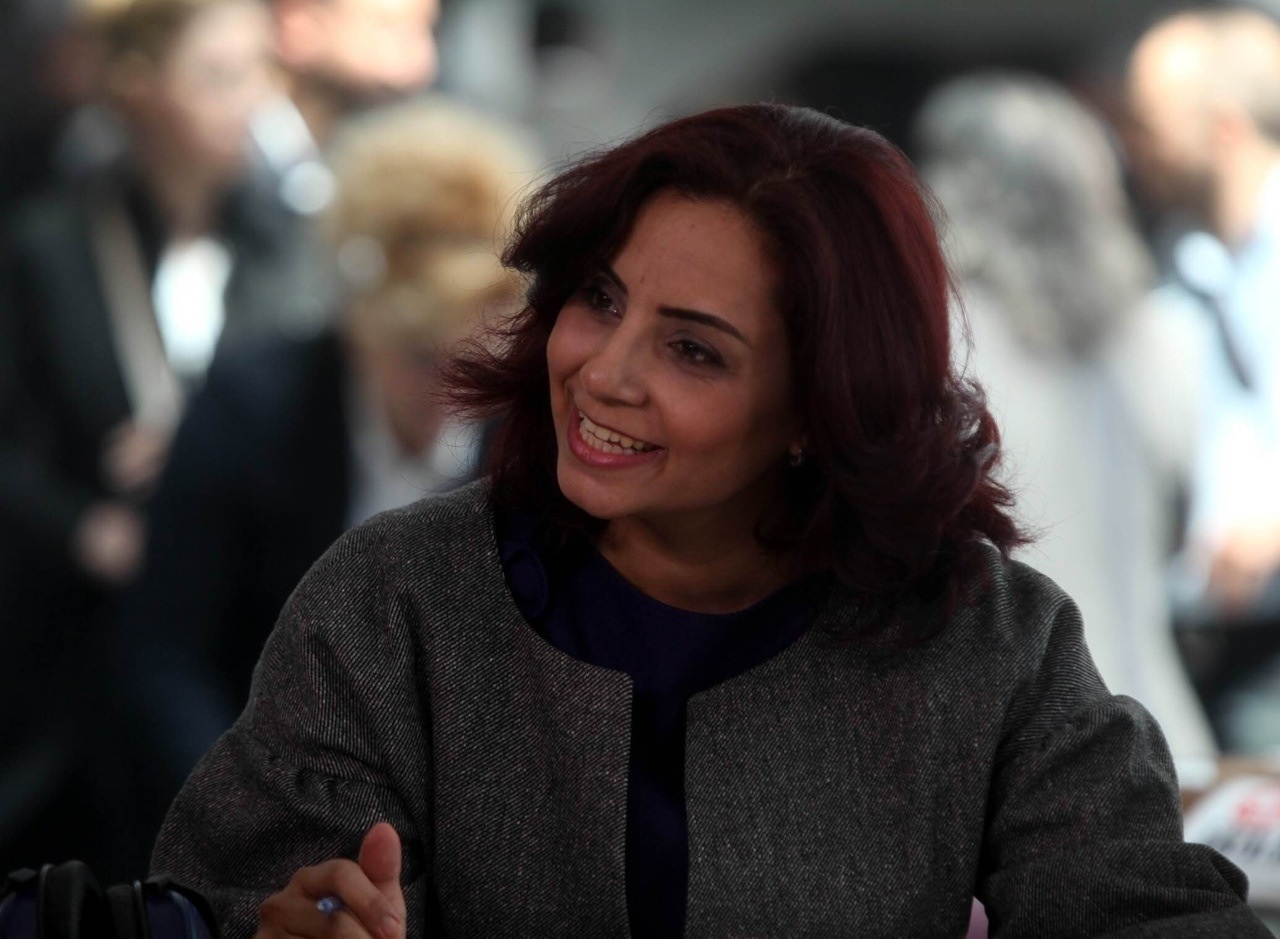Newly Elected MPs Paylan, Doğan Speak about Being Armenian, Turkey Politics
Garo Paylan, an Armenian elected to Turkey’s Parliament on June 7, believes the Armenian Genocide issue should be solved in Turkey. “The Armenian Genocide took place here and coming to terms with the genocide should also take place here,” he said in an interview with Ermenihaber.am, adding that the Diaspora and Armenian political parties, specifically the Armenian Revolutionary Federation (ARF), should continue the struggle in Turkey. Paylan, 42, also spoke about the election results, his future plans as a parliamentarian, and prospects of normalizing Armenia-Turkey relations.
Paylan, a member of the pro-Kurdish People’s Democratic Party (HDP), Markar Esayan from the ruling Justice and Development Party (AKP), and Selina Özuzun Doğan from the Republican People’s Party (CHP) became the first Armenian members of Turkey’s Parliament in decades.

Garo Paylan speaks to Armenian reporters at the HDP offices in the Grand National Assembly of Turkey in Ankara (Photo: Rupen Janbazian, November, 2014)
Speaking about his entry into Turkish politics, Paylan explained that being an active member of the Armenian community prompted his interest in politics. “Even saying ‘I am Armenian’ is a political statement in Turkey. If you are interested in Armenian issues and your identity, then you’re automatically interested in politics,” said Paylan, who explained that his involvement in the Armenian community started in his youth.
Paylan explained how he served as the principal of an Armenian school in Istanbul until Hrant Dink’s murder. “Hrant’s death was a real turning point—it made us politically active… I realized that something needed to change in this country and I dedicated my life to find those responsible for Hrant’s murder. I also wanted to shed light on the problems Armenian students faced in Turkey,” said Paylan. “In 2011, we founded the Democratic People’s Congress (HDK) with a group of social activists, and set up our party in 2013.”
Paylan said that he is ready to work towards the normalization of Armenia-Turkey relations, and that genocide recognition is crucial in the matter. “The Armenian Genocide is often viewed in the context of Armenia-Turkey relations. The Armenian Genocide is only one part of the Armenia-Turkey relations, not the foundation,” said Paylan. “However, as long as the public does not face the true history, the signing of the protocols cannot have a true meaning,” he added.
Paylan said he disagreed with Armenia’s President Serge Sarkisian’s proposal to open the Armenia-Turkey border without any preconditions, and called for Armenian political parties to have a more active role in Turkey. “I do not accept [Sarkisian’s] view. First and foremost, Turkey must recognize its guilt when it comes to the genocide, and hatred towards Armenians and Armenia should disappear. I respect the struggles of both Armenia and the Armenian diaspora and urge all Armenian political parties, namely the Armenian Revolutionary Federation (ARF), to come and carry out their struggle here. Every Armenian that comes to Turkey can have a huge impact,” said Paylan.
Paylan also stressed that he feels a great responsibility to shed light on Armenian issues in his new role. “We [Armenians in Turkey] have a number of problems; confronting the past, Hrant’s [Dink] and Sevag’s [Balikci] unsolved murders, and genocide recognition. We have suffered a huge cultural loss, for which we have not received any compensation,” he said. “I don’t believe we [Armenians] will be able to solve these issues alone. Our party’s principle is to work together with other peoples to overcome these problems,” he added.
Paylan says that he is ready to work with at least one of the two other Armenians elected last Sunday. “Selina [Özuzun Doğan] is a close friend of mine and I believe we can work well together,” said Paylan. “Markar [Essayan] and I shared a similar ideology in the past; we’ve even released joint statements against [Turkish President Recep Tayyip] Erdogan. But over the past three years, his [Essayan’s] rhetoric has been completely pro-government; something that I can’t participate in. If he starts criticizing the wrongdoings of the government, then I would be ready to work with him. If not, his Armenian heritage means little to me,” said Paylan. “Non-Armenians can be much more beneficial to our cause than he has ever been. Many fellow non-Armenian HDP-members have been 1,000 times more compassionate towards the Armenian cause,” he added.
For Paylan, running on the list of another party has always been out of the question. “Equality for all is a very important concept for me. There are many questions to be asked about the democracy preached in all the other major parties in Turkey. They don’t believe in real democracy; they are all centered on individuals. In our party, democracy reigns without any exception. As an Armenian, I have never felt like a foreigner in our party,” said Paylan.
When asked about HDP’s recent success, Paylan said that it was expected. “There is a saying—‘it’s darkest right before dawn.’ Truly, we were at that darkest point and have now entered dawn.”
Doğan: Millions of Armenians lived in Turkey, they are not here today
Newly elected Turkish-Armenian Member of Parliament Selina Özuzun Doğan of Turkey’s Republican People’s Party (CHP) also granted an interview to Ermenihaber.am, during which she said that her party wants Turkey to face its past, but fell short of calling the Armenian Genocide by its true name.
“CHP will admit that there are some issues relating to the past that need to be faced. Like Turkish civil society, the CHP is also in a process of transformation,” Doğan explained. “Our party leader Kemal Kılıçdaroğlu has called the events of 1915 a ‘great tragedy’ and has said that we are not afraid to face the truth. Call the 1915 events whatever you’d like; that is a separate issue. The bottom line is, those people [Armenians] aren’t here today. Millions of Armenians once lived in Turkey—there are only about 50-60,000 today,” she said.

‘No one should doubt the fact that I am Armenian,’ said Doğan, who explained that although there was initially some opposition to her within the party, fellow CHP members have now accepted her (Photo: formiche.net)
In April, Kılıçdaroğlu said that Pope Francis’ statement and the European Parliament (EP) ruling on the Armenian Genocide would not serve reconciliation between Turks and Armenians well, and lent his party’s support to a joint declaration against the EP’s adoption of a resolution on the Centennial of the Armenian Genocide.
When asked how free she felt to express herself as an Armenian within the CHP, Doğan explained that freedom of speech was one of the most important issues for the party. “There is a sense of political morality and respect for freedom of expression within the [CHP], therefore I can freely say whatever I think is true and argue that point until the end,” she explained.
“No one should doubt the fact that I am Armenian,” said Doğan, who explained that although there was initially some opposition to her within the party, fellow CHP members have now accepted her.
According to Doğan, the CHP is ready to normalize relations with all neighboring countries, including Armenia. “Why should the borders be closed and why shouldn’t people be able to trade with each other? There is a major lack of political will to bring the two societies [Armenian and Turkish] closer. There is also a serious negative view of the Armenian diaspora. We need to eliminate that,” said Doğan, adding that she sees her election to Parliament as an initial positive step in that regard. She also said that she did not agree with “tying Armenian-Turkish relations to the Karabagh issue.”
“We need to support the work of non-governmental organizations working on this issue, in order for the two [Armenian and Turkish] societies to better understand each other and for the borders to open,” she said.
When asked about her role as a female politician, Doğan said her party will work hard to eliminate gender inequalities in Turkey. “We will fight all discrimination and violence against women,” she said, adding that Turkey is moving in the right direction in terms of gender equality. “We will have 97 female members of parliament out of 550 in the upcoming Parliament. Although the number is low, it is still a positive leap.”
The post Paylan Calls on Diaspora, ARF to Bring Struggle to Turkey appeared first on Armenian Weekly.